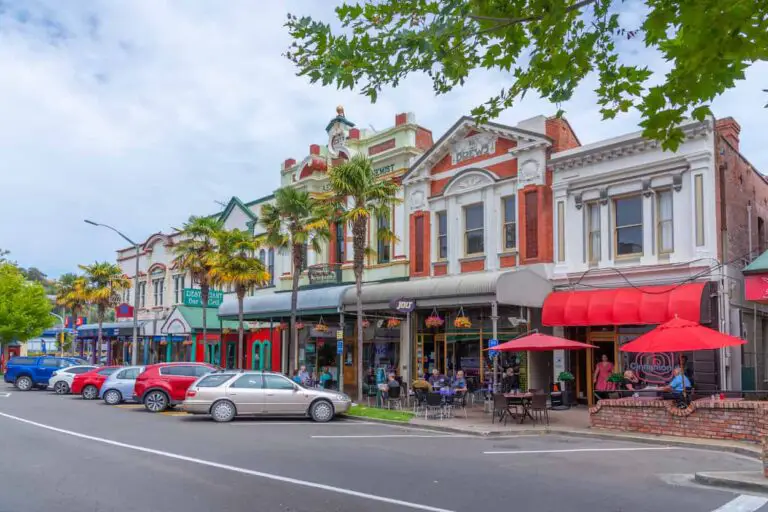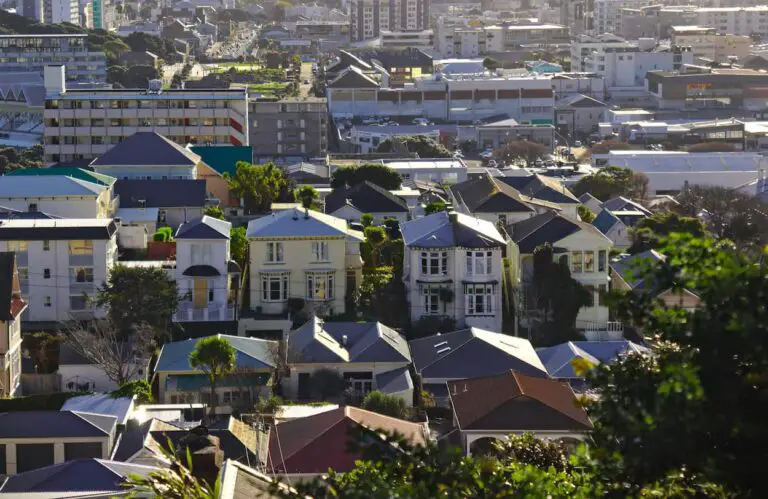Easiest Bank To Get A Home Loan in New Zealand [2024]
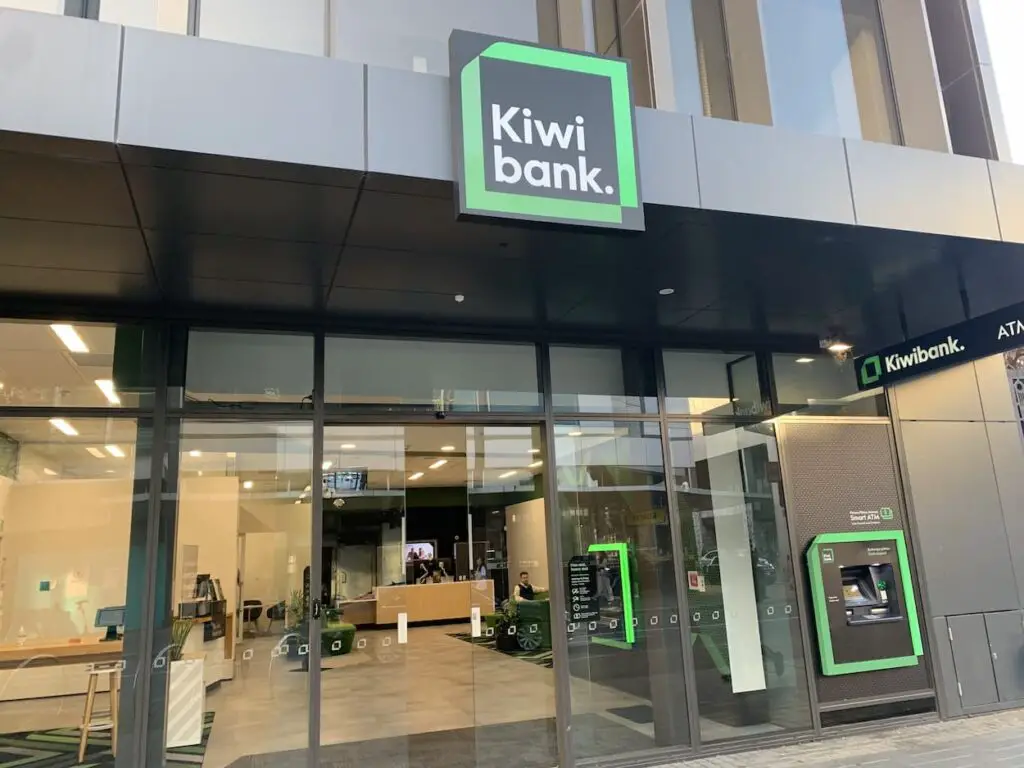
During times when interest rates are rising exponentially, getting a home loan with the best terms is crucial. Generally, New Zealand banks approve loans with a deposit starting at 20%, however, there are some options allowing people to acquire property with a lower investment.
The easiest banks to get a home loan in New Zealand include Squirrel – Launchpad, the Co-operative Bank, TSB, and Kiwibank. They are also best for first-home buyers with a low budget. Moreover, if you don’t have 20% for the deposit, you can use different schemes such as First Home Loan, where you can get a home loan with only 5% of the property price in savings.
Buying a house is a dream of many New Zealanders, and fortunately, you don’t need to have a high deposit to own a home! In this article, we explain what are the easiest and most accessible ways to get a home loan in New Zealand, regardless of your financial situation.
Also read: Best NZ banks for all purposes.
Getting a mortgage in New Zealand: requirements
Before you apply for any loan, you must ensure your eligibility for a mortgage. Here are the standard requirements for getting a mortgage in New Zealand:
- You must be a New Zealand citizen or permanent resident
- Evidence of income – recent payslips;
- If self-employed – the last two year’s full tax returns, yet, it’s more difficult to get a loan as self-employed
- Ratio of income and debt – you must be able to afford a loan; provide, e.g., statements for savings accounts, statements for credit cards, personal loans, leases, etc.
- Minimal deposit – at least 5% of the property price
Moreover, if you want to get a home loan with only a 5% deposit, e.g., via First Home Loans, you need to meet further requirements:
- You must be planning to live in the house you are buying for at least 6 months
- You must not already own any property
- Your household income for the 12 months before you apply must have been:
- Less than $95,000 for individuals
- Less than $150,000 combined if you are buying the property with other people
Minimum deposit
- To get a home loan in New Zealand, you need to have at least 20% of the property price for the initial deposit.
- That said, some state programs allow first-time home buyers to buy a house with only a 5% deposit.
- Besides, banks lend construction loans with just 10% if you plan to build your home.
How much can you borrow?
The maximum amount of the loan depends mainly on the number of borrowers, their annual income, deposit, and ongoing expenses.
Loan duration
Be prepared to pay your mortgage for some time. The standard home loan term in New Zealand is 30 years. The longer the borrowing time, the lower your monthly repayments are. However, in the end, your mortgage will be more expensive, hence, you will pay a large sum in total compared to a shorter term.
Home loans with low deposit
There are limited ways of buying a home with a minimal deposit, such as 5% or 10%. The standard required deposit is 20%. Here are the most common schemes to get a mortgage with a minimum deposit:
- Use KiwiSaver
- Use First Home Loan – you need at least 5% of the value of the property
- Build your first home – you may get away with a 10% deposit
Some banks will lend you money even with less than a 20% deposit, assuming you have a good income, a secure job, and no additional debts that might affect your ability to repay the loan.
Keep in mind if banks offer home loans with 10% to 15% deposit, the interest rates are usually higher if you were depositing 20%+ of the property price. Moreover, the latest RBNZ mortgage figures show that the most recent first-home buyers in New Zealand (68%) had a deposit of at least 20%.
Since house prices range widely depending on the location, here is how much you will need to save for a 10% or 20% deposit:
| City | Median price | 10% deposit | 20% deposit |
|---|---|---|---|
| Auckland | $1,065,000 | $106,500 | $213,000 |
| Tasman | $869,500 | $86,950 | $173,900 |
| Bay Of Plenty | $857,000 | $85,700 | $171,400 |
| National | $810,000 | $81,000 | $162,000 |
| Wellington | $795,000 | $79,500 | $159,000 |
| Waikato | $789,000 | $78,900 | $157,800 |
| Northland | $729,500 | $72,950 | $145,900 |
| Marlborough | $700,000 | $70,000 | $140,000 |
| Nelson | $700,000 | $70,000 | $140,000 |
| Hawke’s Bay | $687,500 | $68,750 | $137,500 |
| Otago | $685,000 | $68,500 | $137,000 |
| Canterbury | $668,000 | $66,800 | $133,600 |
| Gisborne | $660,000 | $66,000 | $132,000 |
| Taranaki | $620,000 | $62,000 | $124,000 |
| Manawatu/Wanganui | $574,000 | $57,400 | $114,800 |
| Southland | $475,000 | $47,500 | $95,000 |
| West Coast | $420,000 | $42,000 | $84,000 |
1. First Home Loan scheme: how does it work?
The First Home Loan is one of the most common ways to get a home loan with a minimal deposit. In fact, just 5% of the property price might be enough.
The First Home Loan is a financial support program offered by Kāinga Ora (Homes and Communities), which acts as an underwriter on the loans. However, this scheme is only suitable for first-time home buyers. Moreover, this program includes some price gaps where you can’t purchase a house above a particular amount, which ranges within regions.
Here are the main requirements you need to meet to qualify:
- Be over 18
- Have at least 5% for the deposit
- Have earned less than the income caps in the last 12 months
- Not owning any property or land
- Have been contributing at least the minimum amount to KiwiSaver (or complying fund or exempt employer scheme) for 3 years or more
- A property must be within the regional house price caps
- Live in your new house for at least 6 months
Income requirements for First Home Loan
Besides above mentioned requirements, in the 12 months before you apply, you must have earned:
- $95,000 or less before tax for an individual buyer
- $150,000 or less before tax for an individual buyer with one or more dependents
- $150,000 or less before tax for 2 or more buyers, regardless of the number of dependents
Below you can see price caps that apply as of 15 May 2023:
| Region | Existing properties ($) | New properties ($) |
|---|---|---|
| Far North District | 400,000 | 675,000 |
| Whangārei District | 600,000 | 800,000 |
| Kaipara District | 525,000 | 875,000 |
| Auckland | 875,000 | 875,000 |
| Thames-Coromandel District | 875,000 | 925,000 |
| Hauraki District | 550,000 | 650,000 |
| Matamata-Piako District | 625,000 | 800,000 |
| Hamilton Urban Area (Hamilton City, Waipā District, Waikato District) | 650,000 | 775,000 |
| Ōtorohanga District | 400,000 | 650,000 |
| South Waikato District | 400,000 | 650,000 |
| Waitomo District | 400,000 | 650,000 |
| Taupō District | 575,000 | 825,000 |
| Tauranga Urban Area (Tauranga, Western Bay of Plenty District) | 800,000 | 875,000 |
| Rotorua District | 525,000 | 650,000 |
| Whakatāne District | 500,000 | 800,000 |
| Kawerau District | 400,000 | 650,000 |
| Ōpōtiki District | 400,000 | 650,000 |
| Gisborne District | 450,000 | 650,000 |
| Wairoa District | 400,000 | 650,000 |
| Napier-Hastings (Napier City, Hastings District) | 625,000 | 825,000 |
| Central Hawke’s Bay District | 500,000 | 650,000 |
| New Plymouth District | 525,000 | 675,000 |
| Stratford District | 400,000 | 650,000 |
| South Taranaki District | 400,000 | 650,000 |
| Ruapehu District | 400,000 | 650,000 |
| Whanganui District | 425,000 | 650,000 |
| Rangitikei District | 400,000 | 650,000 |
| Manawatū District | 525,000 | 650,000 |
| Palmerston North City | 575,000 | 700,000 |
| Tararua District | 400,000 | 650,000 |
| Horowhenua District | 525,000 | 650,000 |
| Wairarapa (Masterton District, Carterton District, South Wairarapa District) | 600,000 | 800,000 |
| Wellington Urban Area (Kāpiti Coast District, Upper Hutt City, Porirua City, Lower Hutt City, Wellington City) | 750,000 | 925,000 |
| Nelson-Tasman (Nelson City, Tasman District) | 650,000 | 875,000 |
| Marlborough District | 550,000 | 650,000 |
| Kaikōura District | 700,000 | 700,000 |
| Buller District | 400,000 | 650,000 |
| Grey District | 400,000 | 650,000 |
| Westland District | 400,000 | 650,000 |
| Hurunui District | 425,000 | 650,000 |
| Christchurch Urban Area (Waimakariri District, Christchurch City, Selwyn District) | 575,000 | 775,000 |
| Ashburton District | 400,000 | 650,000 |
| Timaru District | 400,000 | 650,000 |
| Mackenzie District | 500,000 | 650,000 |
| Waimate District | 400,000 | 650,000 |
| Waitaki District | 400,000 | 650,000 |
| Central Otago District | 525,000 | 800,000 |
| Queenstown-Lakes District | 875,000 | 925,000 |
| Dunedin City | 500,000 | 675,000 |
| Clutha District | 400,000 | 650,000 |
| Southland District | 500,000 | 650,000 |
| Gore District | 400,000 | 650,000 |
| Invercargill City | 400,000 | 650,000 |
How much do houses cost in New Zealand? Find out in the dedicated guide.
Not all NZ banks participate in the First Home Loan scheme, here are some of them:
- Westpac
- TSB
- Kiwibank
- The Co-operative Bank
- SBS
- NZCU (New Zealand Credit Union)
- NZ Home Loans
- Nelson Building Society
There are some pros and cons to taking a First Home Loan, namely:
Pros
- Opportunity to buy a home without large investment: Not everyone has hundreds of thousands sitting in their bank account to spend on their deposit. With First Home Loan, you can buy your own place with less than $50,000 in savings.
- Owning a home faster than it can be: Owning a property is always a good deal doesn’t matter what. Financially, you will be in a better situation when having your own house, which is growing in value year after year.
- Chose the structure of the loan: You can decide if you want to borrow with a fixed rate, a variable rate, an offset mortgage, or a combo of them.
Cons
- LMI (Lenders Mortgage Insurance) costs: Using the First Home Loan scheme, you’ll pay 1% of the mortgage balance extra as a one-off fee, which is usually added to the loan balance. This will usually mean an extra $3,000 to $5,000, depending on the size of the loan.
- You will have a larger loan with higher monthly repayments: Because of the minimal deposit, your mortgage will be quite large, and so will monthly payments.
Not all NZ banks participate in the First Home Loan scheme, here are some of them:
- Westpac
- TSB
- Kiwibank
- The Co-operative Bank
- SBS
- NZCU (New Zealand Credit Union)
- NZ Home Loans
- Nelson Building Society
2. Housing association support
Housing associations such as the New Zealand Housing Foundation allow you to buy part of a house but live in the whole dwelling. For instance, they offer Welcome Home Loans, where you can get a mortgage with only a 10% deposit.
While you get a mortgage from a normal bank, as usual, the homeownership is shared with the association until you have the money to buy the whole house. They don’t charge you a penny. Additionally, you can sell your share in the house if something changes.
Therefore, The Housing Foundation support arrangement is a great way to own equity if you don’t have the money to buy an entire home.
3. KiwiSaver
KiwiSaver helps first-home buyers by providing a First Home Grant if they meet the criteria. To qualify, you must have been contributing to your KiwiSaver fund for at least three years or more. Below are the grants KiwiSaver offers:
- Up to $5,000 for individuals and up to $10,000 for two or more eligible buyers to put towards the purchase of an existing/older home
- Up to $10,000 for individuals and up to $20,000 for two or more eligible buyers to help with the costs of purchasing a brand-new home
Generally, you receive $1,000 for each year you have been a KiwiSaver member for up to a total of five years. This means you could get $3,000, $4,000, or $5,000 to put towards a deposit. If you’re buying a new build, the grant doubles to $2,000 per year.
4. Building your own house
Lastly, some banks will lend you money with a lower deposit if you decide to build your own house instead of buying an existing one. It also applies to property at the early stage of construction and buying from a developer within six months of completion.
In that situation, the LVR rules won’t apply, hence, a deposit of 20% isn’t required. The exact deposit requirement will depend on the bank and your situation, but as a rule, you can count on 10%.
Looking for a budget way to build your own house?
Other expenses related to buying a home in New Zealand
Don’t forget that the price you pay for a house isn’t the only expense you should budget for. Here are all the related costs that go into acquiring in New Zealand:
- Legal fees – Buying real estate also includes hiring a lawyer in order to transfer the ownership. It’s advisable to budget around between $1,000 to $3,500.
- Building inspection or Registered valuation – While building inspection is up to you, registered valuation is often required by the bank if the house is bought with less than a 20% deposit. It can cost from $500 to $2,000, depending on house size and location, and additional tests.
- Interest rates: When you lend money from the bank, you always have to pay interest rates. Yet, if you are taking a loan with a lower-than-usual deposit, you might run into higher interest rates (unless you are in the First Home Loan scheme).
- The LMI fee – because you are lending money with a lower deposit and avoid LEM, you pay 1% of the borrowed amount as Lending Mortgage Insurance. If your mortgage is $450,000, you’ll need to either pay $4,500 upfront or have it added to the loan.
- Moving costs – moving costs can range drastically depending on your possessions and location. You can expect anything from $200 to $1,000.
- Furniture and fittings – here are also no set limits, depending on your needs and taste, you can budget from several hundred to tens of thousands of dollars. Generally, furnishing a two-bedroom house with the cheapest but new furniture will set you back by $5,000 to $10,000.
Best banks for first home buyers in New Zealand
So, now you are aware of what schemes are available for someone with a low deposit. Here are the best banks to take a home loan as a first-time buyer on a budget if you want to go straight to the lender.
Squirrel – Launchpad
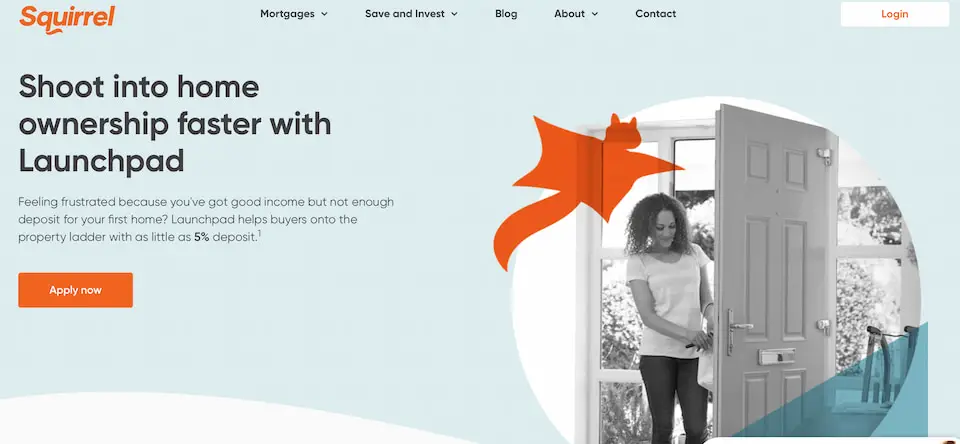
Launchpad is a hybrid blend of a regular mortgage and a personal loan. It’s designed specifically for FHBs who earn too much to qualify for government assistance but still need a little help with their deposit.
Saving for a traditional 20% deposit can add years to saving for a first home. But Launchpad cuts the deposit needed to 5% for properties up to $800k and up to 10% for more expensive homes.
| House price | Maximum LVR (Loan-to-value ratio) | Minimum deposit | Launchpad loan |
| $1,100,000 | 91% | $100,000 | $1,000,000 |
| $1,000,000 | 92% | $80,000 | $920,000 |
| $900,000 | 93% | $60,000 | $840,000 |
| $800,000 | 95% | $40,000 | $760,000 |
| $700,000 | 95% | $35,000 | $665,000 |
The Co-operative Bank

The Co-operative Bank doesn’t offer cash incentives or low initial deposits, however, first-time home buyers can enjoy a special interest rate of 6.59% p.a. for one year fixed. The offer is also available for Kāinga Ora First Home Loans.
TSB
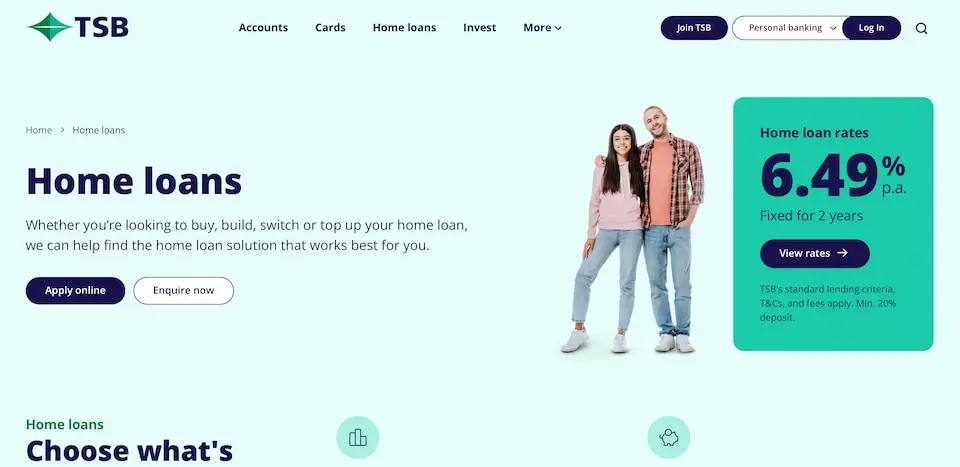
TSB is a small bank but has the highest satisfaction among its customers. Their home loans start at 6.49% p.a., which is fixed for 2 years.
Here are the current rates of home loans at TSB Bank:
| Term | Special Rate (Minimum 20% deposit) | Standard Rate (Less than 20% deposit) |
|---|---|---|
| 6 months | 6.99% p.a. | 7.79% p.a. |
| 1 year | 6.99% p.a. | 7.79% p.a. |
| 18 months | 6.75% p.a. | 7.55% p.a. |
| 2 years | 6.49% p.a. | 7.29% p.a. |
| 3 years | 6.39% p.a. | 7.19% p.a. |
| 4 years | 6.29% p.a. | 7.09% p.a. |
| 5 years | 6.29% p.a. | 7.09% p.a. |
| Housing variable | 8.64% p.a. | 9.44% p.a. |
| Revolving credit | 8.74% p.a. | – |
Kiwibank

Kiwibank is a reputable NZ bank and is a provider of home loans for many Kiwis. At the moment, they offer the following rates:
- 6.89% – fixed for one year
- 6.59% – fixed for 2 years
- 8.50% – variable
Below is a detailed overview of their interest rates:
| Term | Special interest rate if you have more than 20% equity | Standard interest rate if you have less than 20% equity |
|---|---|---|
| 6 month fixed | 7.15% p.a. | 8.15% p.a. |
| 1 year fixed | 6.89% p.a. | 7.89% p.a. |
| 2 year fixed | 6.59% p.a. | 7.59% p.a. |
| 3 year fixed | 6.29% p.a. | 7.19% p.a. |
| 4 year fixed | 6.15% p.a. | 7.05% p.a. |
| 5 year fixed | 6.29% p.a. | 7.19% p.a. |
| Variable | 8.50% p.a. | 8.50% p.a. |
| Offset variable | 8.50% p.a. | 8.50% p.a. |
| Revolving | 8.55% p.a. | 8.55% p.a. |
NZ Home Loans

New Zealand Home Loans is a large mortgage brokerage that is solely dedicated to helping people pay off their mortgages faster. Therefore, it’s a great company for someone who already has a mortgage.
Yes, NZHL will restructure your current loan and help you pay it off. But to do so, they need to move your mortgage to one of the lenders they work with. Kiwibank is one of the main lenders NZHL works with, among others. In fact, NZ Home Loans is owned by Kiwibank.
Interest rates on home loans in New Zealand
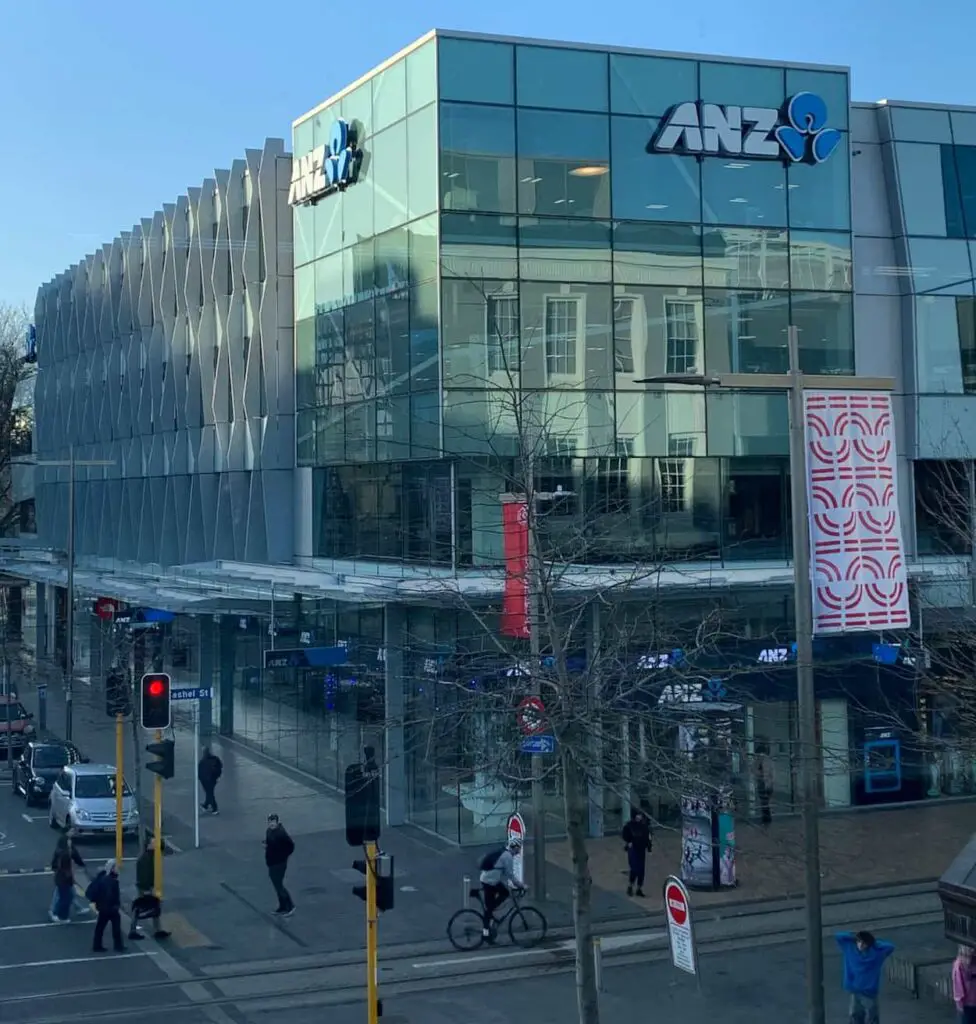
All mortgages come with interest rates, or what the bank charges you for loaning the money. There are 4 main variations among interest rates which you can choose from:
- Fixed – the interest rate won’t change or be affected by the market.
- Floating/Variable – the interest rate will move with the market.
- Combine Fixed and Floating/Variable is one of the best options.
- Revolving – the interest rate will move with the market.
Below are interest rates at the largest NZ banks as of July 2023:
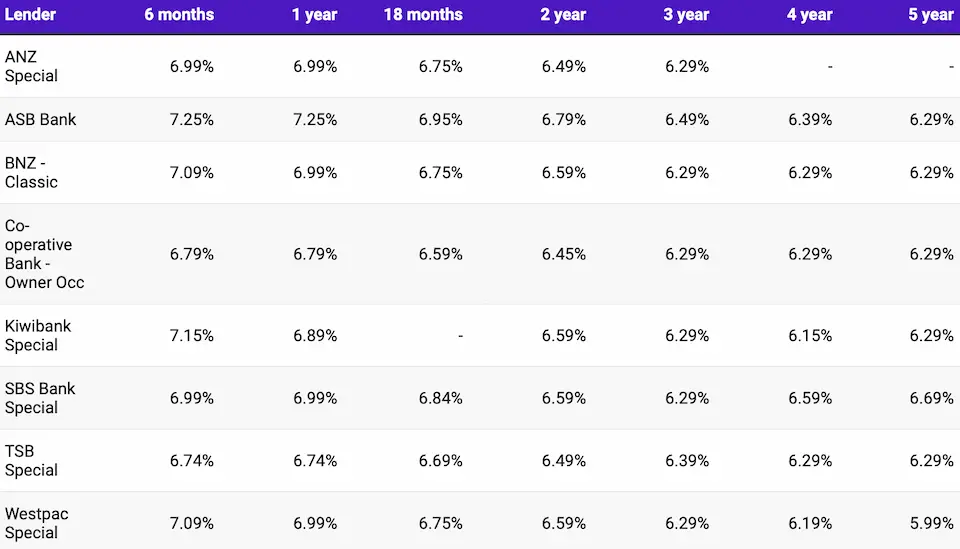

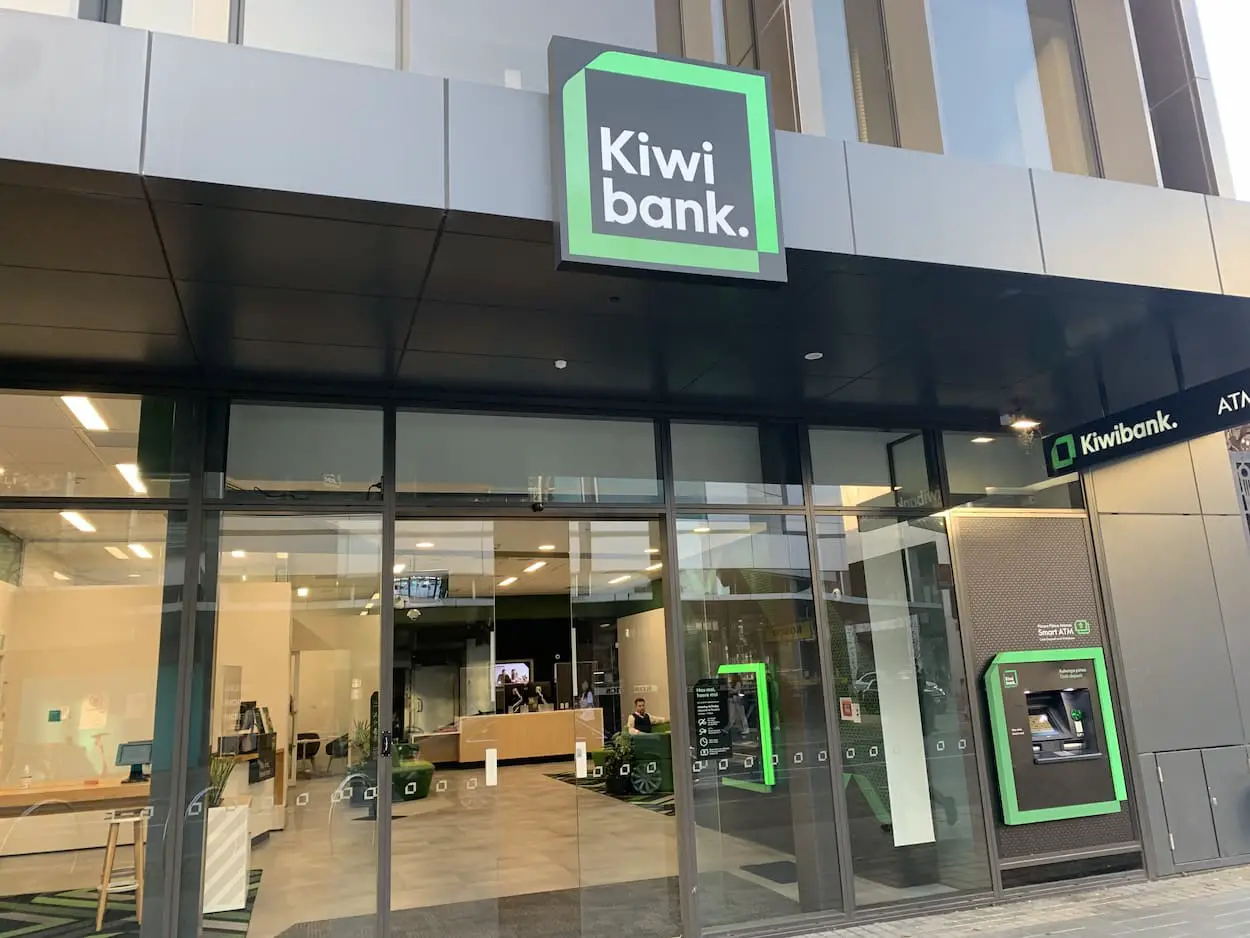

![Retirement in New Zealand: An Ultimate Guide [2024]](https://simplenewzealand.com/wp-content/uploads/2023/06/pxfuel.com-1-768x512.jpg)
![25 Best Side Hustles Ideas in New Zealand [2024]](https://simplenewzealand.com/wp-content/uploads/2023/07/wallpaperflare.com_wallpaper-1-1-768x499.jpg)
